Free the Committee on Climate Change
A note for the Committee on Climate Change
I intended to respond to the Zero carbon economy: Call for Evidence from the UK Committee on Climate Change (CCC) but after a few weeks of being bedridden (nothing life-threatening), I missed the 7th December deadline. Having worked on preparation that I did not want to waste I have written this note.
Summary:
- The Climate Change Act (2008) measures greenhouse gas emissions incorrectly.
- This shows UK emissions falling sharply but ignores aviation, shipping and imports.
- UK emissions, measured properly, are falling far too slowly.
- Per person UK greenhouse gas emissions are nearly twice the global average.
- To keep the global temperature rise to less than 1.5°C, there is a limit to global emissions – the remaining carbon budget.
- At the current rate, global emissions will exhaust this budget in 12.7 years.
- Unless emissions from production can be reduced quickly, consumption must be reduced.
- That means #degrowth.
- Most greenhouse gas emissions are caused by the affluent.
- To save the climate, the affluent must consume less.
- We need to find pleasant lifestyles that are climate friendly, which can attract world wide support.
- A new disciplineis necessary … enhanced town planning.
- The UK government’s climate brief has passed from an environmental department, DEFRA, to a business department, the Department of Business, Energy and Information Services BEIS.
- BEIS is not serious about climate, promoting economic growth and fracking.
- BEIS is the sponsoring department of the CCC.
- The CCC must be freed from its sponsoring department, BEIS.
Context of the call for evidence
The purpose of the CCC’s Zero carbon economy: Call for Evidence was to inform the CCC’s forthcoming advice to the UK Government requested by the Department of Business, Energy and Industrial Strategy (BEIS). The letter to Lord Deben, Chair of the CCC, set out the parameters for the advice. BEIS is the government department that sponsors the CCC. It is also the government department that is the lead on climate policy, but it promotes fracking suggesting it is much more interested in business than climate.
Note: Carbon Dioxide and Carbon Dioxide Equivalent
Carbon dioxide (CO2) is the main greenhouse gas (GHG) causing most of the global warming created by human activity. There are other GHGs, such as methane and nitrous oxide which contribute to human induced global warming. Emissions of these other GHGs are added to the effects of CO2 to form carbon dioxide equivalent (CO2e). CO2e is an approximation but converting to CO2e allows comparisons with other sources of emissions data. It is robust enough for the discussion here.
In this note, where CO2 quantities have been given in terms of CO2 alone, they are increased by 18% to approximate to that quantity in terms of CO2e. CO2 is converted to CO2e by a factor in line with the CO2e/CO2 ratio in UK national statistics, Greenhouse gas emissions in 2013. (CO2e figures are 18% higher than CO2 ones.)
Accounting methods for greenhouse gas emissions
One accounting method for the UK’s carbon emissions is to measure the amount of greenhouse gasses that are emitted within the UK’s boundaries These are territorial emissions – also called production emissions. These include the emissions generated when cars are manufactured, beef is produced, or UK homes are heated. Territorial emissions are the method of measurement specified in the Climate Change Act 2008. They exclude the emissions from international aviation, shipping and imports. Using this method of ac-counting, the UK government, via BEIS, claims that the UK is a leader in the fight against climate change.
Because important emissions are ignored, territorial emissions are a poor measure with which to claim climate leadership: When a UK steel works is closed, its emissions are no longer counted so UK territorial emissions fall. However, the UK will import replacement steel from overseas: The closure may increase global emissions if UK production was more carbon efficient.
Another method of accounting is to estimate the greenhouse gas emissions that were emitted by producing goods and services for consumption in the UK, irrespective of where the emissions occur. These are consumption emissions, which do take account of the emissions due to aviation, shipping and imports. Making these calculations requires more work. For this reason, production accounting was chosen over consumption accounting as an international standard when the Kyoto Protocol was signed in 1997, despite its clear defects in accounting for national responsibilities.
To its credit, the CCC has commissioned work to estimate the UK’s greenhouse gas emissions on a consumption basis. This shows there has only been a small reduction in UK GHG emissions since the 1990s.
This work is now commissioned by the Department of Environment, Food and Rural Affairs (DEFRA) and is published yearly. Since this estimate needs more data to calculate, it is published two years in arrears.
Remaining carbon budget, for 1.5C rise.
The IPCC’s Special Report on Global Warming of 1.5ºC (SR15) calculates the limits on greenhouse as emissions for keeping the rise in average world temperature within 1.5°C of the pre-industrial temperature. Table 2.2 in SR15 shows that if 580 billion tonnes of CO2 (580 Gt CO2) are emitted before reaching zero emissions it may be possible (50% possibility) that Earth’s temperature rise will be within the 1.5°C limit. Table 2.2 also gives estimates for their being a 33% and a 66% chance of keeping within this limit. These (optimistically?) assume that there will be no extra feedbacks, such as greenhouse gasses from melting tundra, that will reduce these budgets.

This budget was from the beginning of 2018. If the emissions in 2018 are deducted from the budgets to get the budgets as of the beginning of 2019, they are smaller:

It is implicit in these numbers that as well as CO2, other greenhouse gasses are emitted. When budgets have been calculated for CO2, parallel budgets for these other gases are assumed. The combined budgets, CO2 budget plus the budgets for these other gases, are a bit larger. In this note 18% has been added so that, for example, the 538 Gt CO2 budget becomes 635 Gt CO2e:

Personal remaining budgets
The 50% chance figure divided by the population of the world (7.64 billion) gives a personal remaining budget of 83 tonnes CO2e per person:

The Global Carbon Project (GCP_2018) gives world GHG emissions for the year 2018 as 50.1 billion tonnes of CO2e [after conversion from CO2 by adding 18%]. That is emission of 6.57 tonnes CO2e per person. At this rate of emissions, the budget to remain within the 1.5°C rise (50% chance) would be exhausted in 12.7 years:

For a linear decline in emissions, starting at the beginning of 2019, emissions would need to fall by 3.9% of the 2018 emissions each year to keep within the 1.5°C (50%) budget. This is an average fall in emissions of 240 kgs per person per year, starting at 6.57 tonnes CO2e.
Sadly, in 2018, according to GCP_2018 global emissions rose by 2.7%.
In the UK emissions per person, based on data from DEFRA, are 11.94 tonnes CO2e per person, nearly twice the global average.
The carbon intensity of production and economic growth
Almost everything you buy will have caused the emission of greenhouse gasses that drive climate change. Mike Berners-Lee has estimated that for every £1000 spent on a new car its production has caused the emission of 636 Kgs of CO2 – plus some other greenhouse gasses [Note 1].
The Global Carbon Project has estimated that, in 2017, for every £1000 spent in the world, an average of 422 Kgs of CO2 was emitted. [Note 2] The amount of CO2 emitted for each £1000 spent is called the emissions intensity of production. It is more usually expressed in kilogrammes of CO2 per US dollar of productions as shown in this graph from GCP_2018 that has some extra annotations.
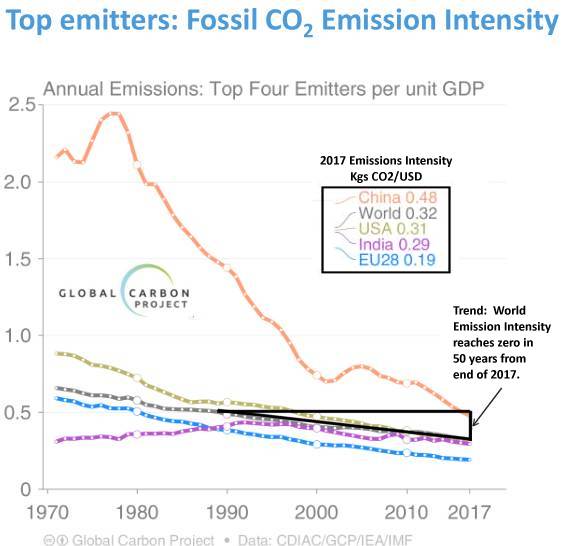
Figure 2
A rise in emissions intensity of 1% means that similar goods will be produced with 1% more emissions. Also, a 1% rise in production creates 1% more emissions. When both change the % change in emissions is given by
% change in production + % change in emissions intensity
Over 30 years, up until 2017 there has been a steady decrease emissions intensity. This has been equal to 2.0% its value in 2017 each year. This rate has been reasonably constant over this time span. At this rate, emissions intensity would reach zero in 50 years in 2068.
If there were no change in global production, (i.e. no global economic growth), global emissions would fall at this same rate of 2.0% per year reaching zero in 2068. By that time global emissions would total 1251 Gt CO2e, exceeding even the 33% chance of global temperatures remaining below 1.5°C – according to the IPCC SR15 report.
This means to stay within budget for 1.5C (50% chance), either emissions intensity must be reduced at a much faster rate than hitherto or production and consumption must be rapidly reduced. That is negative economic growth, sometimes called degrowth.
It is the UK Government’s policy, through BEIS, to promote economic growth. Despite their relationship with BEIS, the CCC should advise government that economic growth, on a world scale, is not compatible with the IPCC SR15 target of keeping the global rise in temperature below 1.5°C.
A warning about IPCC, SR15
Warning comments on IPCCSR15 come from Gavin Schmidt, Director of NASA, on the RealClimate website. He summarises:
Can we avoid going through 1.5ºC?
IPCC has to use a few circumlocutions to avoid giving a direct answer to this question (for reasonable and understandable reasons). I’m not quite so constrained…
There are many issues related to the feasibility question of which physical climate-related issues are only one. The basic issue is that the effort to reduce emissions sufficiently to never get past 1.5ºC would require a global effort to decarbonize starting immediately that would dwarf current efforts or pledges. This seems unlikely (IMO).
So my answer is… no.
BEIS is the lead UK Government Department on Climate Policy. It is the sponsoring department for the Met Office and therefore the Hadley Centre for climate research as well as the CCC. As noted above BEIS supports fracking and economic growth. It is unlikely that it would support the necessary policies to promote “a global effort to decarbonize starting immediately”.
The CCC and the climate scientists of the Met Office must resist the influence of BEIS, even if this is contrary to statuary duties.
Trends in UK carbon emissions
In October 2017, The Clean Growth Strategy from BEIS said:
Since 1990, we have cut emissions by 42 per cent while our economy has grown by two thirds. This means that we have reduced emissions faster than any other G7 nation, while leading the G7 group of countries in growth in national income over this period.
The Clean Growth Strategy also said:
Clean growth means growing our national income
while cutting greenhouse gas emissions.
In occasional years there have been “Clean Growth”: greenhouse gas emissions fell and national production and consumption has increased. However, the fall in emissions has been small – except for the years of the financial crash of 2007-2009 when the UK’s GDP fell sharply as Figure 1 showed.
To keep within the remaining carbon budget for 1.5°C the global emissions must fall at a much faster rate, 3.9% of the 2018 emissions until zero.in mid 2040s.
If DEFRA’s estimates of the UK’s greenhouse gas emissions are banded into 5 yearly the following table is obtained:
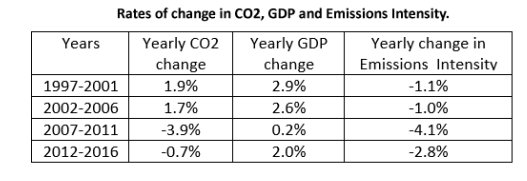
Only in the years 2007-2011 does the rate of fall in emissions reach the necessary global rate for the 1.5°C limit.
Worse, according to the consumption accounting method, the UK’s emissions in 2019 were 11.9 tonnes per person, nearly double the average emissions of 6.76 tonnes CO2e for the rest of the world.
With the remaining carbon budget of 83 tonnes CO2e per person (see Table 4 above) and stating with emissions in 2019 of 11.9 tonnes we have the following table:
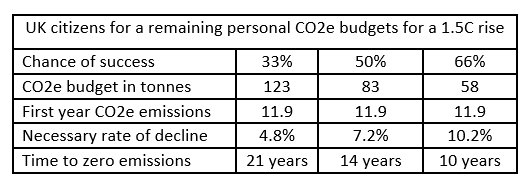
The CCC should make clear in their report that UK emissions are not falling anywhere near fast enough even to have a 33% chance. On a per person basis we are much higher than the global average
Inequalities in GHG emissions, global and UK
The Oxfam infographic below shows carbon emissions by income band for the world’s population. The most affluent 10% of the world create half of the global emissions:
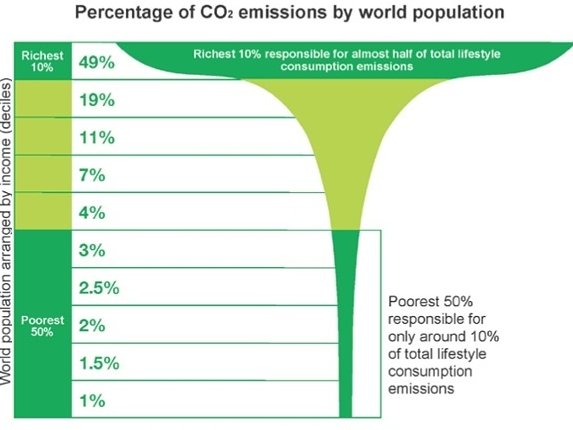
Household CO2 emissions in Great Britain can be found in a report commissioned by the Joseph Rowntree Foundation. (JRF). It was authored by Katy Hargreaves, Ian Preston, Vicki White and Joshua Thumim of the Centre for Sustainable Energy. It has this diagram showing the ‘Proportional contribution of each income decile to total emissions by source’:
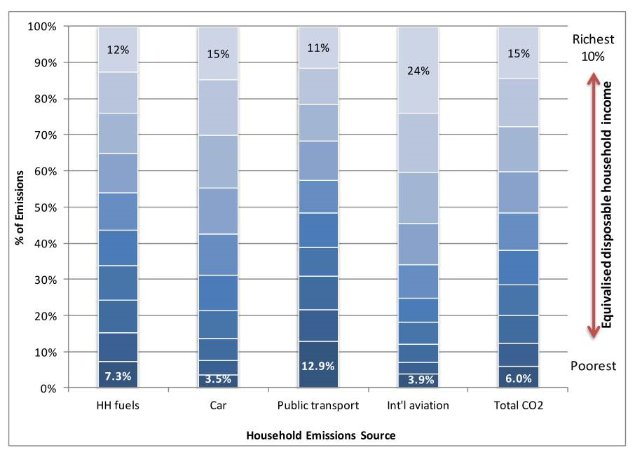
This shows that the richest households create 55% more emissions from heating their houses than the poorest households. For car travel, they create more than 4 times the emissions of the poorest and for international air travel they create over 10 times as many emissions.
The above charts clearly show that both globally, and in the UK, the bulk of greenhouse gas emissions are caused by affluent lifestyles.
This inequitable distribution is underrepresented in the publications of the CCC. Is this because it is a message, which is unwelcome to the CCC’s sponsoring department, the Department of Business, Energy and Information Services? BEIS’s advocacy of ‘clean growth’ suggests economic growth for everybody when the whole economy must shrink. That’s degrowth.
It ignores the obvious: The affluent must cut their consumption.
In the past Lord Deben has expressed the view that there are political limits to what can be achieved. To save the world from disaster, it is necessary to overcome these political limitations.
Climate Leadership: The BEIS version
In a BEIS press release, Call for new green innovations to tackle climate change (October 2018), the Business Secretary Greg Clark said:
The UK is a world leader in tackling climate change, cutting our emissions more than 40% since 1990 while growing our economy. When you combine Britain’s leadership, innovation and determination it is an unbeatable combination – exactly what our Industrial Strategy and Green GB Week are supporting and encouraging.
As noted a 40% fall in greenhouse gas emissions is only correct when considered territorially as opposed to the more truthful consumption basis. In fact, UK emissions have hardly fallen and the UK is not a leader in tackling climate change.
BEIS supports fracking
In Energy minister accused of contradicting herself by using threat of Russia to justify fracking (October 2018), , the Independent reported:
Energy minister Claire Perry has been accused of making a “muddled” case for fracking in the UK,
Ms Perry spoke out in support of the controversial fossil fuel technology, claiming shale gas extraction was needed to ensure the country is not dependent on gas from Russia.
However, this appears to contradict previous statements she made, which saw her claim that Britain was “in no way reliant” on Russian gas.
Official figures from the Department for Business, Enterprise and Industrial Strategy (BEIS) show that less than 1 per cent of the UK’s gas supply comes from Russia.
BEIS has also been accused of dropping questions on fracking from its quarterly survey of public attitudes on energy because the results showed that the public was opposed. In BEIS scales back public opinion research on fracking Business Green reported:
for the first time since 2013 people were not asked whether they supported or opposed shale gas exploration or nuclear energy in the UK. The last survey to ask these questions in April found just 18 per cent supported fracking and 32 per cent opposed, with almost half (47 per cent) neither for or against.
History of the government’s climate brief
Prior to 2008, the department of UK government holding the climate brief was DEFRA. In 2007, Bob Watson, previously chair of the IPCC, became DEFRA’s Chief Scientist. He has a strong emphasis on climate change. For example he spoke on the UK’s rising carbon footprint at the 2012 fall meeting of the AGU.
In 2008, the climate brief was taken away from DEFRA and given to the new Department of Energy and Climate Change (DECC). Reports suggest that the change gave the fossil fuel interests an advantage over renewable energy, downgrading the importance of climate. In Shell and BP alone eclipse renewable energy sector on access to ministers, The Guardian reported
The pair of oil and gas giants [BP and Shell] also secured more than twice as many meetings with ministers as two of their most well-known adversaries, Greenpeace and Friends of the Earth, who had 67 meetings with ministers between them.
In addition, when David Kennedy, the Chief Executive of the CCC, won the competition to become the Permanent Secretary at DECC, the Prime Minister, David Cameron vetoed his appointment:
Asked about his decision to veto the appointment, the PM said it would be “wrong” to comment on individual cases.
But he went on to explain how “the ability to do deals” was vital to help the department “sell” its policies.
He also said the government should have an “open mind” on the process of obtaining shale gas known as fracking.
BBC: Cameron defends decision to block top civil service appointment
It seems that David Kennedy was keener on climate than than he was on fracking.
Climate policy was further downgraded when the climate brief was passed to the new Department of Business, Energy and Information Services (BEIS). Climate change no longer appeared in the title of any government department. Perhaps the scientists at DECC had begun to take climate change too seriously. But in Why the end of DECC could be good news on climate change (July 2016), Samuel Frankhauser wrote:
Climate sceptics were jubilant, sensing a second victory after the Brexit vote that most of them supported. Environmentalists were alarmed not just about climate change, but about environmental protection post-Brexit more broadly.
In 2019 it is hard to follow Frankhauser’s optimism for the department that promotes fracking. The ‘environmentalists’ were right. BEIS seems more likely to downgrade the importance of climate change than was the case with DECC.
At the time of its creation in 2008, the CCC’s sponsoring department was DECC. It is now BEIS.
The role for the Committee on Climate Change
About the Committee on Climate Change, Our role says:
The Committee on Climate Change (the CCC) is an independent, statutory body established under the Climate Change Act 2008.
Our purpose is to advise the UK Government and Devolved Administrations on emissions targets and report to Parliament on progress made in reducing greenhouse gas emissions and preparing for climate change.
As seen above the accounting method for greenhouse gas emissions under the Climate Change Act 2008, is territorial, ignoring international air travel, shipping and the greenhouse gas emissions embodied in UK imports. It is fundamentally flawed.
It is to the committee’s credit that they have, in the past, commissioned work on the measurement of greenhouse gas emissions, based on UK consumption. This role has been taken up by DEFRA.
It is again to the CCC’s credit that Lord Deben wrote Greg Clark, The Secretary of State at BEIS, pointing out the consequences to climate due to new airport capacity.
But could Greg Clark have replied “Aircraft emissions are not the business of the committee. They are not counted under the accounting method the committee should be using.”?
I look forward to the time when the CCC has an expanded role in leading the UK and the rest of the world on climate change.
That means replacing the Climate Change Act 2008 by something much better and freeing the Committee on Climate Change from any influence from BEIS.
Climate leadership
The UK is now a minor part of the global economy, consequently UK emissions are a small proportion of global emissions.
It is possible for the UK to become a leader in tackling climate change by prototyping the design of pleasant lifestyles that do not damage the climate: lifestyles that might appeal to the affluent as well as to the many billions in the world that aspire to be affluent.
This is an exciting design exercise, which must combine many disciplines and talents. It needs input from engineers, economists, climate scientists, agronomists, house builders, architects, town planners, psychologists, marketing experts & anyone with innovative talent.
It is enhanced town planning.
